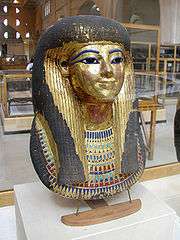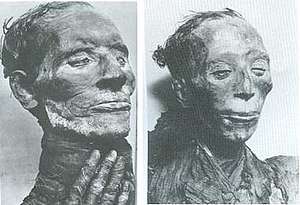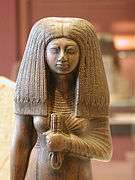Tjuyu
Tjuyu (sometimes transliterated as Thuya or Thuyu) was an Egyptian noblewoman and the mother of queen Tiye, and the wife of Yuya. She is the grandmother of Akhenaten, and great grandmother of Tutankhamun.
Tjuyu | |
|---|---|
 Gilded cartonnage mask of Thuya in the Cairo Museum | |
| Other names | Thuya, Thuyu |
| Spouse(s) | Yuya |
| Children | Tiye and Anen, possibly Ay |
| Relatives | Akhenaten (grandson) |
| Tjuyu in hieroglyphs |
|---|
Biography
Tjuyu is believed to be a descendant of Queen Ahmose-Nefertari, and she held many official roles in the interwoven religion and government of Ancient Egypt. She was involved in many religious cults; her titles included 'Singer of Hathor' and 'Chief of the Entertainers' of both Amun and Min.[1] She also held the influential offices of Superintendent of the Harem of the god Min of Akhmin and of Amun of Thebes.[2] She married Yuya, a powerful Ancient Egyptian courtier of the eighteenth dynasty. She is believed to have died in around 1375 BC in her early to mid 50s.
Children
Yuya and Tjuyu had a daughter named Tiye, who became the consort and Great Royal Wife of Pharaoh Amenhotep III. The great royal wife was the highest Egyptian religious position, serving alongside of the pharaoh in official ceremonies and rituals.
Yuya and Thuya also had a son named Anen, who carried the titles Chancellor of Lower Egypt, Second Prophet of Amun, sm-priest of Heliopolis and Divine Father.[3]
They also may have been the parents of Ay,[4] an Egyptian courtier active during the reign of pharaoh Akhenaten, who eventually became pharaoh, as Kheperkheprure Ay, however, there is no conclusive evidence regarding the kinship of Yuya and Ay, although certainly, both men came from Akhmim.[5]
Tomb
Together with her husband, Tjuyu was buried in the Valley of the Kings, in KV46, where their largely unpillaged remains were found in 1905. It was the best-preserved tomb discovered before that of Tutankhamun, Tjuyu's great-grandson. The tomb was discovered by a team of workmen that were led by American millionaire Theodore M. Davis and archaeologist Arthur Weigall.[6]
 The mummy of her husband, Yuya (left), and to the right, Tjuyu
The mummy of her husband, Yuya (left), and to the right, Tjuyu.jpg) Inner coffin of Tjuyu
Inner coffin of Tjuyu Statue of Tjuyu, now in the Louvre
Statue of Tjuyu, now in the Louvre
References
- Tyldesley, Joyce. Chronicles of the Queens of Egypt. Thames & Hudson, 2006. p.116
- Cyril Aldred: Akhenaten, King of Egypt Thames and Hudson, 1989. p.96
- Rice, Michael (1999). Who's Who in Ancient Egypt. Routledge, p.20
- Rice, p.222
- David, Anthony, E. and Rosalie David. A Biographical Dictionary of Ancient Egypt. London: Seaby, 1992. p.167
- Adams, John (2013). The Millionaire and the Mummies. New York: St. Martin's Press. p. 16. ISBN 9781250026699.